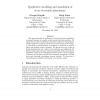Free Online Productivity Tools
i2Speak
i2Symbol
i2OCR
iTex2Img
iWeb2Print
iWeb2Shot
i2Type
iPdf2Split
iPdf2Merge
i2Bopomofo
i2Arabic
i2Style
i2Image
i2PDF
iLatex2Rtf
Sci2ools
JASSS
1998
1998
Qualitative modeling and simulation of socio-economic phenomena
This paper describes an application of recently developed qualitative reasoning techniques to complex, socio{economic allocation problems. We explain why we believe traditional optimization methods are inappropriate and how qualitative reasoning could overcome some of these shortcomings. A case study is presented where an authority is expected to devise a policy that satis
es certain constraints. We describe how sets of rules of thumb implementing such a policy can be analyzed and validated by the decision maker using a program which automatically builds and simulates qualitative models of the underlying dynamical system. Such a program constructs and simulates models from incomplete descriptions of initial states and functional relationships between variables. We show that it nevertheless gives sucient information to the decision maker.
Related Content
| Added | 22 Dec 2010 |
| Updated | 22 Dec 2010 |
| Type | Journal |
| Year | 1998 |
| Where | JASSS |
| Authors | Giorgio Brajnik, Marji Lines |
Comments (0)

